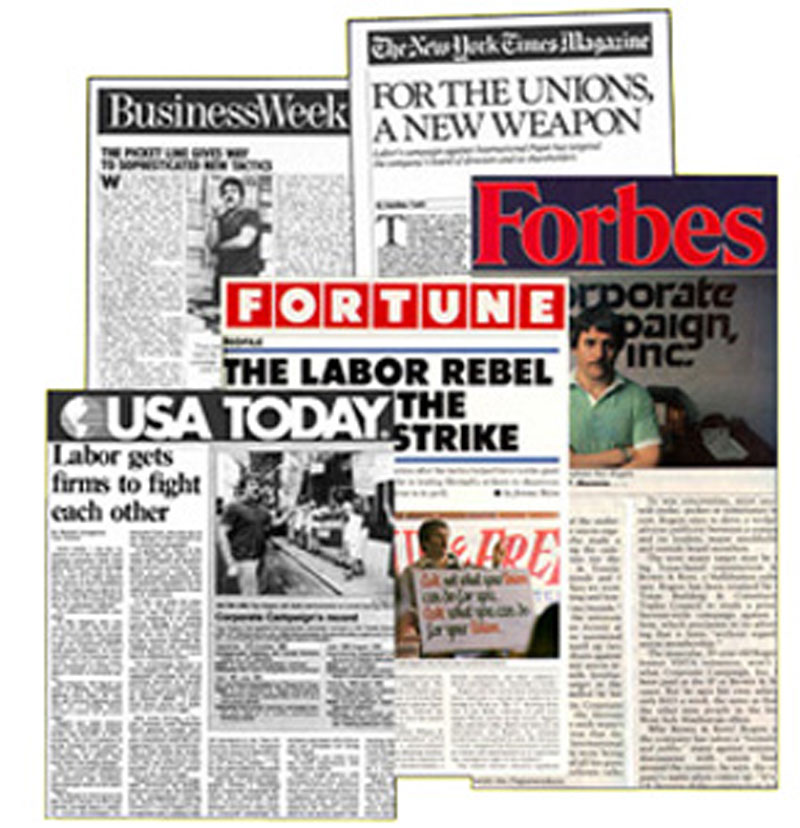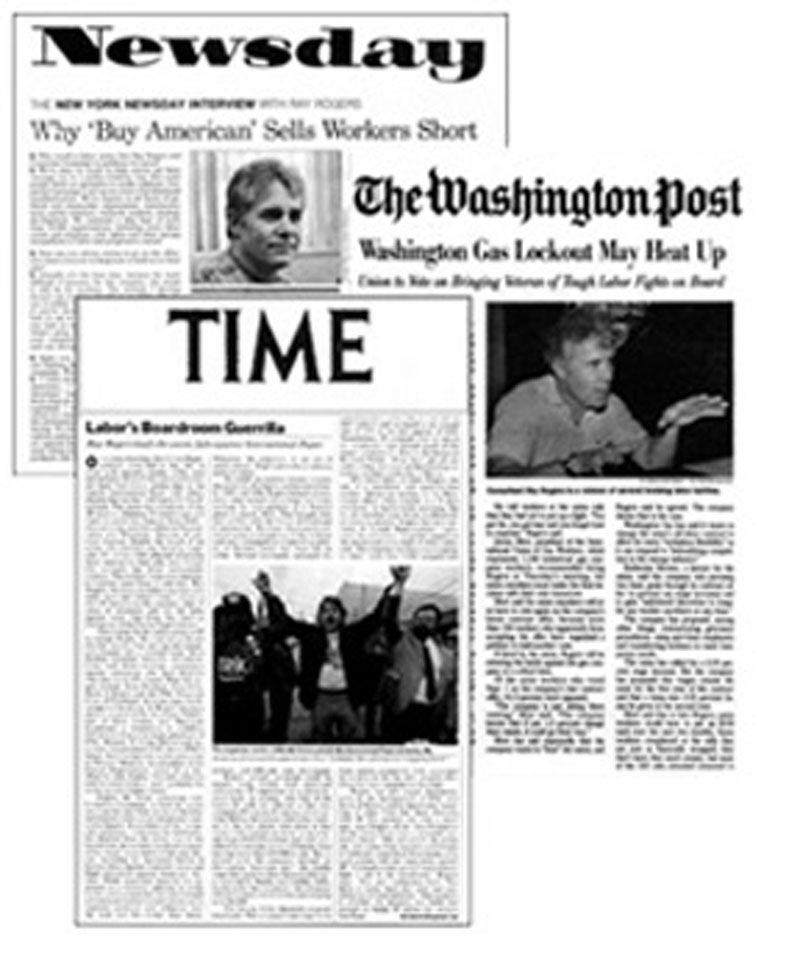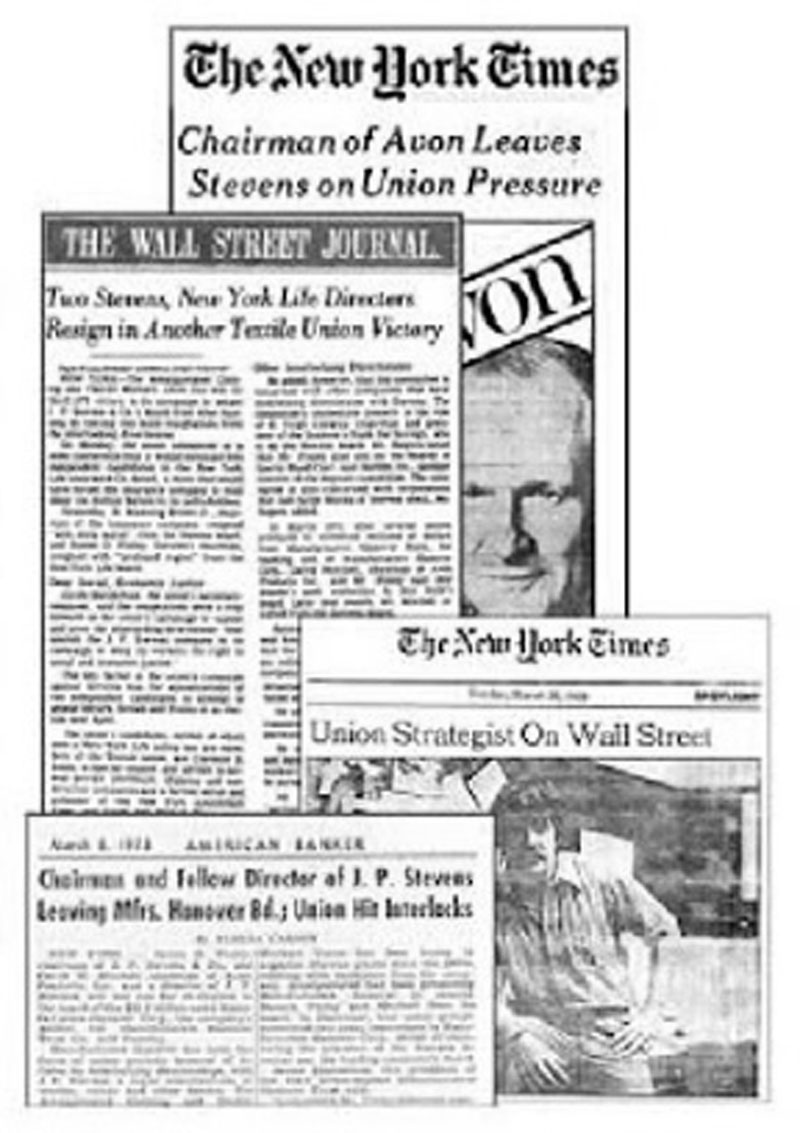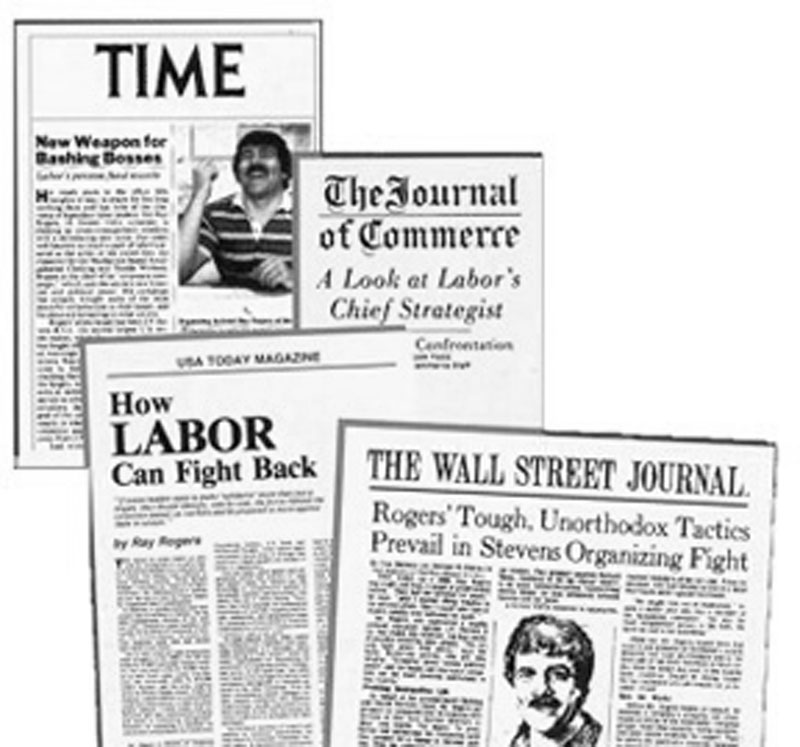Biographical Sketch of Ray Rogers

Ray Rogers is founder and director of New York City based Corporate Campaign Inc. (CCI), which has championed labor, human rights and environmental causes for three decades. He was born in Beverly, Mass., the son of a union machinist and an electronics assembler. He graduated from the University of Massachusetts in 1967 and spent two years working in Tennessee as a VISTA volunteer. His work on behalf of impoverished people in Appalachia was cited and commended by the Tennessee legislature and featured on NBC Nightly News. Later, he worked with reformers in the United Mine Workers Union to oust its corrupt leaders who were later convicted of the murder of union presidential candidate Jock Yablonski, his wife and daughter.
From 1976 to 1980, while on the staff of the Amalgamated Clothing and Textile Workers, he devised and led its pioneering corporate campaign against the notoriously anti-union J.P. Stevens & Co. on which the Academy Award winning film "Norma Rae" was based. He defined the corporate campaign as a "mechanism to confront power with power." The campaign led to the resignations of the chief executive officers of J.P. Stevens, Avon Products and New York Life Insurance Co. from the boards of Manufacturers Hanover Trust, New York Life and J.P. Stevens. The Wall Street Journal headline (10/21/80) read, "Rogers' Unorthodox Tactics Prevail in Stevens Organizing Fight." Two years earlier, he organized a unique boycott in Alabama that led to the historic Amalgamated Clothing Workers of America victory for 3,000 Chicanos against Texas-based Farah Manufacturing Co. The Boston Herald described Rogers as labor's most innovative strategist and "one of the most successful union organizers since the CIO sit-down strikes of the 1930s."
In the 1980s, Rogers developed campaigns that led to high profile victories for airline, paper and utility workers. He also developed a successful corporate campaign strategy against Campbell Soup Co. for the Farm Labor Organizing Committee, seeking to represent thousands of migrant farm workers. The strategy was instrumental in ending a six-year strike and boycott and winning the union its first contract. In that same period, Rogers became one of the most controversial figures in the labor movement when he developed a campaign against Geo. A. Hormel & Co. for UFCW Local P-9 in Austin, Minnesota. During the campaign he was jailed under a criminal syndicalism statute that was later declared unconstitutional. Presently, Corporate Campaign is donating its services to develop strategy for FLOC, which is challenging R.J. Reynolds and the tobacco industry over their abuse of thousands of migrant farmworkers from Mexico. In June 2010, FLOC's corporate campaign led to the forced resignation of Betsy Atkins from the board of Reynolds American/RJ Reynolds. In 2011, under increased pressure form the campaign, Reynolds Chair & CEO Susan Ivey left the company.
Time magazine said Rogers has "brought some of the most powerful corporations to their knees, and his ideas are spreading." In 1995, the US Chamber of Commerce, Republican Congressman Peter Hoekstra of Michigan and other big business interests launched an unsuccessful effort to outlaw "corporate campaigns," the term Rogers coined to describe strategies and tactics that help achieve victories for labor and other victims of abusive corporations and government agencies. For years, Rogers has refused offers to work for and be co-opted by America's largest corporate associations.
In 1999, Corporate Campaign developed the contract campaign for Transport Workers Union Local 100 in New York City at a time when the union was beleaguered with internal political strife and written off by the press and labor critics as having no chance to win a decent contract. CCI got major portions of the political factions working together and the local's 33,000 members, who operate and maintain New York City's subways and buses, won a settlement described on the front page of The New York Times as containing "the largest annual raises received by any of New York City's public employee unions in nearly a decade." In 2000, CCI developed a unique public sector campaign strategy for the 53,000-member New York State Public Employees Federation that put extreme pressure on Governor George Pataki and other political leaders and led to major contract gains, when all other efforts had failed.
In 2001-2, CCI provided critical assistance in helping Pacifica Radio listeners take back the nation's first and only non-commercial, free-speech radio network from a predatory, pro-corporate faction that had seized control of its national board. CCI raised funds for the campaign and helped develop and implement the strategy that led to the resignations of several board members. At the same time, CCI and Rogers, an animal welfare advocate and a vegetarian, played a vital role working with national environmental, public interest and religious organizations in the successful struggle to prevent oil drilling in the Arctic National Wildlife Refuge coastal plain.
Since its launching in 2003, Ray Rogers has directed the Campaign to Stop Killer Coke which was developed by Corporate Campaign. In a cover story in The Nation, "It's the Real Thing — The Drink That Represses," (5/1/06) journalist Michael Blanding wrote:
"In the past two years the Coke campaign has grown into the largest anti-corporate movement since the campaign against Nike for sweatshop abuses... The fight to hold it accountable has, in turn, broadly connected issues across continents to become a truly globalized grassroots movement."
Rogers was described as a "legendary union activist" in the Business Week article "'Killer Coke' or Innocent Abroad? — Controversy over anti-union violence in Colombia has colleges banning Coca-Cola" (1/23/06). In a Financial Times story (11/20/06), he was called The Coca-Cola Company's "fiercest foe." Rogers and the Campaign to Stop Killer Coke are featured in a full-length documentary, The Coca-Cola Case, produced by Argus Films and the National Film Board of Canada, released in 2010 can be accessed on Netflix. The Campaign is highlighted in Mark Thomas's "Belching Out the Devil" published in 2008 in the UK and 2009 in the U.S. and Michael Blanding's "The Coke Machine" (published in 2010).
In 2009 and 2010, working with International Brotherhood of Electrical Workers (IBEW) Local 103, Corporate Campaign helped the union win significant victories against three major corporations in the entertainment, pharmaceutical and financial industries.
Rogers and his organization have been featured many times in major publications such as Time, Business Week, Forbes, Fortune, The Wall Street Journal, The New York Times, USA Today, The Washington Post, Los Angeles Times, Chicago Tribune, Boston Globe and Atlanta Journal Constitution as well as many television and radio programs and newscasts worldwide. Rogers is cited in Marquis Who's Who in America. His work as a labor strategist has led to many college and universities in the U.S. and abroad, including Harvard Business School, to conduct case studies on CCI's campaigns, strategies, and tactics.
"Workers and other victims of corporate greed cannot simply legislate, litigate or advertise away their problems," Rogers says. "They must organize aggressively and take their fights into the boardrooms of those at the center of the corporate and political web of power...Corporate, financial and political power brokers can be pitted one against the other, to divide and conquer them the way they have divided and conquered poor and working people."
As profiled in the book "We Will Be Heard: Voices in the Struggle for Constitutional Rights Past and Present" by Bud and Ruth Schultz (Merrell Publishers, 2008), Rogers is one of 94 portraits of "individuals who have stood up for their constitutional and human rights in the face of repression by the American government".
Confronting Power with Power: Corporate Campaign Founder Ray Rogers















